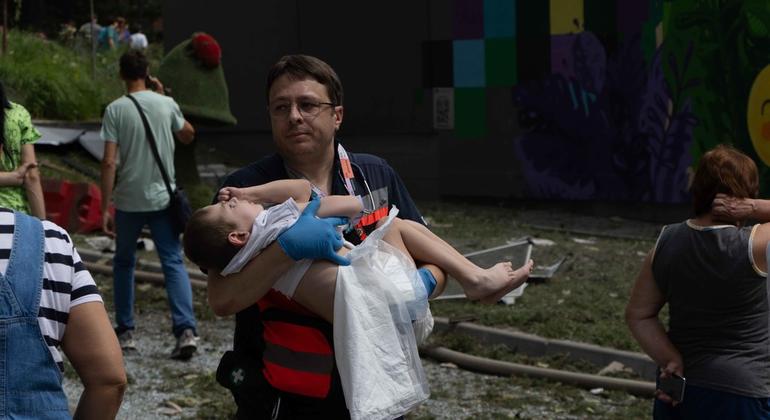The attack also damaged 130 buildings and rescue teams are still working to clear the rubble.
Rescue operations
Rescue efforts have been halted after airstrikes on Monday hit and damaged the Okhmatdit Children’s Hospital.
Six children injured in the attack are being assisted, and around 600 pediatric patients have been transferred to various medical facilities in the city and surrounding areas for treatment, according to local officials and partners.
OCHA reported that relief organizations were providing emergency medical assistance and psychological support to civilians and providing supplies such as drinking water and hygiene kits.
“Aid workers have signed up people for cash assistance, including families whose relatives have been killed or injured and those whose homes have been damaged,” it added.
Other UN agencies, including the World Health Organization (WHO), continue to work with medical personnel to provide aid and medical equipment.
Libya: Call for release of kidnapped political activist
The United Nations Support Mission in Libya (UNSMIL) said on Wednesday it was deeply concerned by reports of the recent abduction of a missing political activist.
Al-Moatassim al-Ariibi, 29, was kidnapped on Monday in the northwestern city of Misrata, about 187 kilometers east of the capital, Tripoli.
In a statement, UNSMIL reiterated the call of Misrata city council members and community representatives to the city’s security and law enforcement agencies to urgently investigate his abduction, locate him, and ensure his safety and immediate release.
The Mission has documented at least 60 cases of people currently being detained across Libya for actual or perceived political affiliation.
“The Mission calls for the immediate and unconditional release of all those arbitrarily detained and for those responsible for such arbitrary detention to be held accountable,” the statement concluded.

Thai fishermen bring their catch ashore.
New report warns of climate impacts on fish biomass
A new report from the Food and Agriculture Organization of the United Nations (FAO) warns that climate change could have severe effects on fish stocks in almost all ocean regions, affecting major fishing nations and countries that are highly dependent on seafood.
The FAO report argues that global estimates of available fish biomass could decline by more than 10 percent in many regions by mid-century, especially under high emissions scenarios.
Under a high emissions scenario, the planet is projected to warm by 3 to 4 degrees by the end of the century, with fish biomass declining by more than 30% in 48 countries and regions.
But if emissions remain low, 178 countries and territories will see little change and fish populations will decline by less than 10%.
Adapting to change
FAO Assistant Director-General Manuel Balangue said understanding the likely impacts of climate change on marine ecosystems was necessary to stimulate adaptation programmes at the right scale.
“Low emissions would result in substantially lower end-of-century biomass losses in almost all countries and regions compared with high emissions,” he said. “This highlights the benefits of climate change mitigation for fisheries and seafood.”
Reducing emissions could benefit many countries and regions, including Small Island Developing States (SIDS), where the ecological and socio-economic concerns related to climate change are greatest and where people primarily depend on fisheries for food and income.
UN official calls for change of course to achieve SDGs
The world needs to change course to achieve the Sustainable Development Goals (SDGs) by 2030, Michal Mlinar, Deputy Executive Director of the United Nations Human Settlements Programme (UN-Habitat), said on Wednesday.
The call was made at a special Local2030 coalition event during the 2024 High-level Political Forum on Sustainable Development (HLPF) in New York.
Mrinal said the 2024 SDG report revealed that only 17 percent of goals were expected to be achieved by 2030, while around 30 percent had seen only marginal progress.
Moreover, progress has “stagnated or is reversing” on more than 30 percent of the SDGs, he added.
“These worrying figures [are] “This is indeed a wake-up call for us to accelerate the implementation of the SDGs and indicates the need to strengthen impactful efforts that have multiplier effects and a multi-stakeholder nature,” he said.
Localization Key
Mrinal said impactful efforts must start from the local level.
He said advancing the SDGs regionally requires tailoring the goals to specific local circumstances and actively engaging all stakeholders in implementing the 2030 Agenda.
UN officials said local 2030 coalitions are making “huge, transformative progress” towards the SDGs at the local level, and this is being done to positively impact the people they serve.
“The people we serve are, of course, the ones who should benefit from the practical cooperation we can streamline in this particular situation,” Mrinar said.



